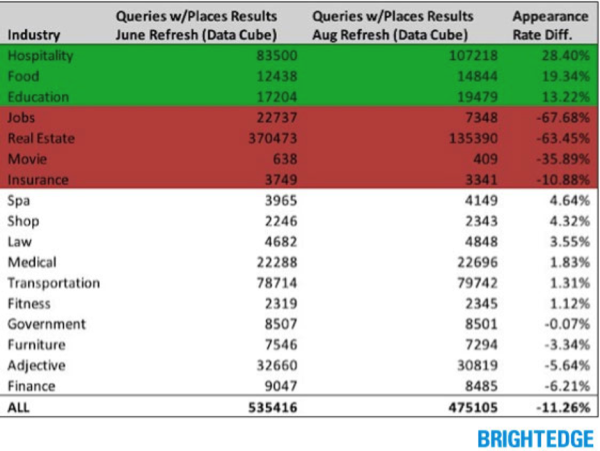How Google Pigeon Impacted Local Queries, and What You Can Do
Since Google's local algorithm update, "Pigeon," took effect in July, local businesses have been scrambling to adjust.
Since Google's local algorithm update, "Pigeon," took effect in July, local businesses have been scrambling to adjust.
Google’s local algorithm update, “Pigeon,” took flight around July 24, 2014, affecting U.S. English queries. Local businesses have been scrambling to adjust, as some deal with the fact that they’re no longer showing in the seven-pack local results at all.
Indeed, some are referring to Pigeon as the biggest Google update to the local search results since the Venice update in 2012. Google said the latest update would make local search more closely mimic traditional organic rankings.
Early reports showed consistent feedback that specific queries and sectors had been impacted, like real estate, and that directories were now being favored in the results above local businesses (possibly due to the authority of a directory site like Yelp over a local business’s site).
And while the latest local algorithm update fixes the problem for Yelp, many businesses have experienced a loss from Pigeon. New data coming from BrightEdge’s Data Cube analysis reveals more about what businesses have been impacted – both positively and negatively – since late July.
Not everyone complained after the latest local algorithm update. As previously mentioned, directories seemed to get a boost, and, so did certain queries. The latest analysis using BrightEdge’s massive data set from June to August shows an uptick in the results for queries related to the following:
Additional wins occurred in smaller percentages for queries related to:
According to the analysis in BrightEdge’s data set, we found queries related to the following topics being the most negatively impacted by Pigeon:
Reports across the Web from multiple sources show real estate queries experiencing dire consequences from Pigeon, and as you can see, the BrightEdge data confirms the same.
Other queries related to the following showed somewhat negligible losses:
The following is a table of the findings. Note that some of the queries were difficult to classify in the analysis, so the industry data by row does not add up to “all” data.

Will the results we’re seeing be definitive? Maybe not. Those who are following the algorithm agree: the Pigeon update has not quite settled into its new home.
Many are reporting a constant flux, and in fact, over at the Local Search Forum, Linda Buquet shares her data that suggests Google is testing two to three version of Pigeon’s results.
As we wait and see what the algorithm will do, it’s best not to panic. Continue to focus on the tried-and-true methods of local search that you’re used to. Here are a few things you should consider …
One of the things Google said happened in the Pigeon update was an improved distance and ranking parameters. And indeed, some reports have shown that results are displaying for a much smaller radius. From the SEW report, “Is Google’s Local Algorithm ‘Pigeon’ for the Birds?”:
Over at Blumenthals.com, for one query, it appeared that the “radius of the search has been reduced significantly. The three organic top results were all located in the suburb to the east of the city,” the site said.
So, it may be time to start thinking even more locally, and begin including neighborhood indicators in your local SEO strategy.
As outlined in an October 2013 post for SEW, here are some considerations for visibility in Google’s local “carousel” results.
Don’t stop performing the best practices, like:
Hopefully, your local SEO campaigns have not been affected too badly, but we’re interested in hearing what others are seeing from Pigeon. Please leave your comments below, and also let me know what additional data you might like to see from BrightEdge in the future on this topic.